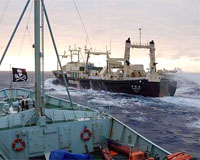| . |  |
. |
Agadir, Morocco (AFP) June 23, 2010 Negotiations on the future of commercial whaling collapsed Wednesday, with pro- and anti-whaling nations unable to break a decades-long deadlock. Since Monday, the 88-member IWC has been debating a draft deal to suspend a 24-year moratorium on commercial whaling for 10 years in return for gradual cuts over the period in the number of whales killed. "The proposal is a dead letter," said Gert Lindermann, the IWC Commissioner from Germany. "We have agreed that we need a period of 'cooling off' to find out if there is real readiness to look for a compromise,' he told AFP. "You have to put this document aside for the moment, we need a pause" Brazil's top negotiator Fabio Pitaluga told the IWC's chairman in a plenary session after two days of intense closed-door meetings. The United States delegate lamented "the inability to find a new paradigm" and said the process "lacked political maturity." Green groups reacted angrily to the collapse of the talks, which they blamed on Tokyo. "The lack of sufficient flexibility shown by Japan to phase out its whaling in the Southern Ocean Whale Sanctuary prevented a decision from being adopted," said Sue Lieberman of the Pew Environmental Group. Iceland, Norway and Japan have continued to use legal loopholes to sidestep the 1986 global whaling ban, harvesting more than 1,500 of the marine mammals in the 2008-2009 season alone. The proposal would have left open the status of the moratorium after 2020. Acting IWC chairman Anthony Liverpool said too many "major issues" remained to be resolved. These include the status of the moratorium, the number of whales that might be killed during a temporary suspension, the status of clauses which allow countries to opt out of decisions taken by the commission, and whether whale products can be traded internationally. Another hot-button issue is the Southern Ocean, declared a whale sanctuary in 1994. Many anti-whaling nations -- Australia, Britain, Germany and most of Latin America -- have called on Tokyo to halt hunting in the nutrient-rich Antarctic waters. But Japanese spokesman Glenn Inwood said this simply isn't going to happen: "That's a deal breaker," he told AFP. Japan's negotiator Yasue Funayama agreed in the plenary session that "there seems no prospect of an agreement." "Some members want to put a halt to all but aboriginal hunting. This position creates an impasse," she said. "There is an absence of political will to compromise," said Geoffrey Palmer, New Zealand's top whaling diplomat and an IWC veteran. Palmer traced a history of rancorous, accusatory talks over the last decade, and warned that the failure to reform could be "fatal" for the IWC. He endorsed the pause, adding that the fundamental identity of the international body was now in doubt. "Is this a treaty about the conservation of whales ... or is it a treaty about whaling and the exploitation of commercial whaling? And can it accommodate both views?" he asked the plenary session. But Palmer -- praised by pro- and anti-whaling nations for his guidance of policy talks -- said acrimony had, in part, given way to a more civil tone of mutual respect, giving some cause for optimism. He also lauded Japan, saying it had "showed real flexibility and a real willingness to compromise." One new idea was tabled in the plenary on how to break the deadlock. Monaco commissioner Frederic Briad called for all whaling -- limited by the IWC's scientifically established conservation criteria -- to be restricted to national territorial waters. The high seas, he said, should be off limits. Of the three whaling nations, only Japan currently ventures beyond its own so-called exclusive economic zone to hunt. But even if Tokyo is likely to reject the proposal, the mayor of the southern Japanese town featured in the Oscar-winning dolphin documentary "The Cove," said it had merit. "I think we can praise the fact that a proposal acknowledging coastal whaling actually emerged," Kazutaka Sangen told reporters here. Because all of Japanese whaling is conducted under the guise of scientific research, a handful of coastal cities have not been allowed to continue their whaling traditions.
Share This Article With Planet Earth
Related Links Follow the Whaling Debate
 Japan slams anti-whaling Sea Shepherd 'attacks' on high seas
Japan slams anti-whaling Sea Shepherd 'attacks' on high seasAgadir, Morocco (AFP) June 23, 2010 Japan assailed activists from the Sea Shepherd group at global whaling talks Wednesday, accusing them of launching "life-threatening" attacks on its whaling ships on the high seas. The International Whaling Commission (IWC), meeting in Agadir, was shown images and video clips of clashes earlier this year in the Southern Ocean, where protesters sought to obstruct hunting of the marine mammals ... read more |
|
| The content herein, unless otherwise known to be public domain, are Copyright 1995-2010 - SpaceDaily. AFP and UPI Wire Stories are copyright Agence France-Presse and United Press International. ESA Portal Reports are copyright European Space Agency. All NASA sourced material is public domain. Additional copyrights may apply in whole or part to other bona fide parties. Advertising does not imply endorsement,agreement or approval of any opinions, statements or information provided by SpaceDaily on any Web page published or hosted by SpaceDaily. Privacy Statement |